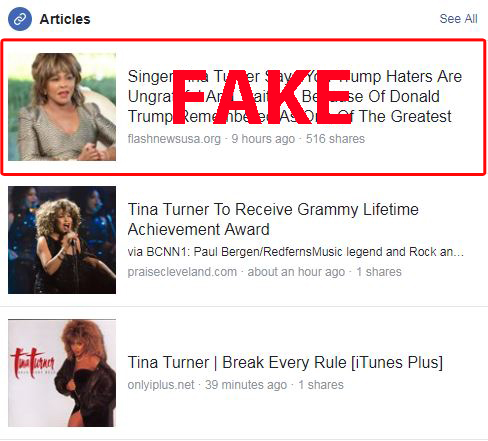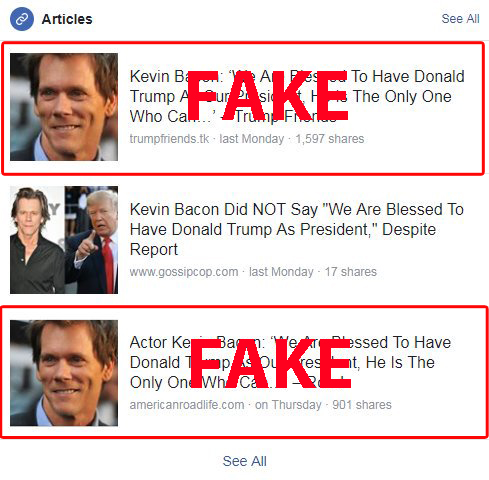Kevin Bacon isn’t actually a Donald Trump supporter. Miley Cyrus didn’t leave the United States to become a British citizen. Sylvester Stallone didn’t say that Barack Obama is a “closet homosexual.”
Unless you’re searching on Facebook, that is.
Over the past few months, searching for celebrities’ names on Facebook has yielded fake news stories pretty high up in results. That’s despite the fact that several of these articles had already been debunked.
A fabricated story about Tina Turner attacking Trump opponents was published on several fake news sites a week and a half ago, amassing more than 8,000 Facebook engagements as of publication, according to BuzzSumo.

Turns out the story wasn’t much of a story at all; it only included a photo and a falsified headline.
But according to Alex Kaplan of Media Matters for America, a left-wing media monitoring group, at least nine other fake celebrity stories have achieved similar virality on the platform — even after they’d been debunked by Facebook’s fact-checking partners.
Targets include Harrison Ford, Jim Carrey, Malia Obama, Katy Perry and Bruce Willis. While we're at it, that trailer for a "Friends" movie isn't real, either.

At the same time, it seems that not everyone receives an “Articles” module in Facebook search. When Poynter attempted to recreate its prior search for Bacon, it surfaced “People Are Saying” and “Posts from Friends” sections — no links. A Facebook spokesperson told Poynter in an email that the feature’s appearance is personalized for each user and the specific search term.
The Bacon story, which was published on several fake sites last month, received more than 3,000 Facebook engagements as of publication, according to BuzzSumo. It also rose to the top of Facebook search results for the actor’s name, despite having previously been debunked by Factcheck.org.

Kaplan, a Media Matters researcher, first flagged the Bacon story and several others on Twitter. It cites fake quotes from a fabricated interview with ABC’s “This Week” that express support for Trump’s presidency. Bacon — who contributed to Hillary Clinton’s campaign during the 2016 U.S. presidential election — later tweeted to say that he isn’t, in fact, a Trump supporter.
And just to be clear to those of you read or believed this original blog. There’s nothing about this presidents policy’s that I agree with. And nothing about his character that I admire. https://t.co/dq10K6ZMh9
— Kevin Bacon (@kevinbacon) December 4, 2017
After debunking the story, Factcheck.org submitted the link to Facebook for flagging, director Eugene Kiely told Poynter in an email. Under the social media company’s partnership with fact-checkers — of which Factcheck.org is a part (and the International Fact-Checking Network helps facilitate) — fake stories are algorithmically demoted in the news feed and given more context in a related articles section after being debunked by at least two fact-checkers.
However, another spokesperson for Facebook told Poynter in an email that it’s still possible for fake news stories to show up in search even after they’ve been labeled false by fact-checkers, as long as they don't violate the company's community standards. That explains why fake celebrity stories that have already been debunked — three of the nine Media Matters identified, by Poynter’s count — often surface high up in search results.
That’s different from search engines like Google, which take sources’ reputability more heavily into account when ranking results. Facebook recently announced major changes to the news feed to both decrease the reach of brands in the news feed and solicit users’ input on which publishers they trust most. It’s unclear how that will impact the distribution of fake news on the platform — especially in search — but for now, engagement is still the name of the game.
And to Michael Lewittes, that’s a problem.
“Obviously it’s not working — that’s the blunt, honest truth,” said the founder of Gossip Cop, a celebrity fact-checking site. “There’s either something wrong in the mechanism or the commitment to it, but clearly it’s not working because the inaccurate and false stories are surfacing to the top irrespective of the hard work of the fact-checkers.”
Why so many fabricated celebrity stories? It’s simple: They tend to be more salacious and do better on social media — and fact checks, which could potentially limit their reach, can’t keep up.
“Sometimes we see our story three or four rungs below the fake story (in search),” Lewittes said. “And ideally it would be nice if everyone read the first, second, third and fourth — but that doesn’t work.
Plus, they’re a safer bet for fake news writers.
Following the 2016 election, increasing pressure on the platforms to do something about political misinformation led to a few changes, notably Facebook and Google going after some of the advertisers that peddle fake news (This move didn’t always work in 2017). Lewittes said that since celebrities are more reluctant to publicly correct fake stories because they could inadvertently give them more attention, it’s often harder to correct them than political hoaxes.
“Having done this for 25 years, it takes time to fact-check,” he said. “The manufactured story could take maybe 20 minutes to write.”
Daniel Harrison, a technology communications manager at Facebook, told Poynter in an email that the platform takes into account fake news and other quality signals from the news feed when determining search results. He said the company is working on new ways to use those signals to improve search.
But until Facebook seriously alters its algorithm to include site authority as a determining ranking measure, Lewittes said users and journalists alike will keep finding misinformation in search.
“Sometimes the most inaccurate stories become the most visual ones,” he said. “Either you weigh what the fact-checkers are saying more, or you don’t pretend that you’re really trying to eradicate this stuff.”







